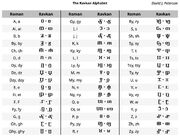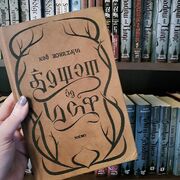
Ravkan alphabet created by David J. Peterson
Ravkan is the language commonly used by the inhabitants of Ravka.
Known Words
Note: Words with known Russian derivation have a ★ next to them.
Modern Ravkan
kefta - garment worn by Grisha (from kaftan)
Sankt - Saint (masculine)
Sankta - Saint (feminine)
Sankt’ya - of the Saints (plural)
dros - the thaw (used with koroleva to make Queen of the Thaw)
milaya - sweet girl ★
pomdrakon - dragonbowl: a Ravkan dish created by lighting raisins on fire
grenatki, grenatye - grenades (both have been used) ★
malenchk(i) - little ghost(s) (-ch- is diminutive)
maleni - ghost(s)
kvas -a traditional fermented Slavic beverage
tsifil - a contagious disease
kapitan - captain
da - yes ★
net - no ★
oprichnik(i) - The Darkling’s personal guard(s), elite soldier(s) ★
moi - my (masculine object) ★
moya - my (feminine object) ★
soverennyi - sovereign, the title used for The Darkling (direct address: moi soverennyi)
tsar - ruler, king, tsar (direct address: moi tsar) ★
tsaritsa - ruler, queen, female tsar, tsaritsa (direct address: moya tsaritsa) ★
odinakovost - sameness, thisness ★
etovost - uniqueness, thatness
otkazat’sya - orphaned, abandoned; used by Grisha to refer to non-Grisha ★ (means to refuse)
istoriya - story ★
istorii - stories ★
kutya - a Ravkan dish ★ (kutya/kutia is a Russian dish)
tsarevich - prince, son of tsar (direct address: moi tsarevich) ★
sobachka - puppy, doggy ★ (sobaka is dog in russian, -ch- is diminutive again)
lapushka - darling, honey, sweetie ★
nichyevo(‘ya) - nothing(s) ★
volkvolny - wolf of the waves ★ (volk=wolf, volny=waves)
provin’ye - real (adjective)
autchen’ye - genuine (adjective)
osti - bones
spasibo - thanks, thank you ★
babki - a children’s game
babink(i) - barbarian(s)
Madraya - mother, mom, mommy (term of address)
merzost - magic, abomination, unnatural creation, something from nothing ★ (abomination)
banya - bathhouse
nolnik(i) - zero(es)
- The term Nolniki as a proper noun is used to refer to the First and Second Army soldiers who work at the Gilded Bog in King of Scars.
rebe - daughter
dva - two ★
dva - of (dva has been used for both two and of at separate times in the Grishaverse)
stolba - mills ★ (means pillars, columns, refers to the ruins of Dva Stolba)
babya - grandmother, old woman (formal address)
Ne zalost! - To your health!
Ne ___! - Long live _____!
razrusha’ya - ruined (sing. or plural) ★ (razrushenny)
- The term Razrusha'ya as a proper noun is used to address and refer to Genya Safin in Ruin and Rising.
razrushhost - ruination ★
khitka - wood sprite
sol - sun (adj.) ★ (solntse)
metan yez - marsh gas ★ (metan=methane, marsh gas)
na - I am not ★ (ne ya)
e‘ya - I am ★ (ya)
kokochnik(i) - headdress, hairpiece(s) ★ (kokoshnik)
luminya - a variation of liquid fire, an almost un-extinguishable flame
beznako - a lost cause
- The term Beznako as a proper noun was used to refer to Malyen Oretsev by the girls at the White Cathedral in Ruin and Rising.
sarafan - a peasant dress ★
yunejhost - unity
Korol Rezni - King of Scars ★ (rezky=to cut)
- Korol Rezni is the title given to Nikolai Lantsov by the peasants of Kribirsk after the events of Ruin and Rising.
korol - king ★
koroleva - queen ★
Sol Koroleva - Sun Queen ★
- Sol Koroleva is the title first used to refer to Alina Starkov by the peasants in Tashta in Siege and Storm, and is later adopted by the Apparat, Alina's religious followers, and the Soldat Sol.
Gruzeburya - the brute wind ★ (burya=storm, gruze=load)
Adezku - the western wind
- This term is first used by Zoya Nazyalensky in King of Scars.
lazlayon - the gilded hollow
- The term Lazlayon as a proper noun is the name of the undercover laboratory and research base designed byNikolai Lantsov and housed by Count Kirigin in King of Scars.
volkshiya - people
Koja - handsome
Ancient Ravkan
e’ya - I am ★ (ya)
sta - become ★ (stat’sya=to become)
rezku - blade ★ (rezky=to cut)
Inspiration

Ravkan edition of Shadow and Bone.
- As explained by Leigh Bardugo, Ravkan is not exactly the same as Russian; the language is heavily inspired by Russian, but is derived from both Russian and Mongolian.
- It seems in part to have a mostly Russian vocabulary, with much simplified noun and adjective plural endings, which may come from Mongolian.
- The written version created by David J. Peterson appears to resemble the Glagolitic script (oldest Slavic writing system) in addition to Cyrillic and is partially intelligible to Cyrillic readers according to Bulgarian native Julian Kostov.
Trivia
- A Ravkan edition of Shadow and Bone exists.
- In episode 6 of Shadow and Bone, Jesper holds up the Ravkan edition of the book that David threw at him.
